I have a several Makefiles in app specific directories like this:
/project1/apps/app_typeA/Makefile
/project1/apps/app_typeB/Makefile
/project1/apps/app_typeC/Makefile
Each Makefile includes a .inc file in this path one level up:
/project1/apps/app_rules.inc
Inside app_rules.inc I'm setting the destination of where I want the binaries to be placed when built. I want all binaries to be in their respective app_type path:
/project1/bin/app_typeA/
I tried using $(CURDIR), like this:
OUTPUT_PATH = /project1/bin/$(CURDIR)
but instead I got the binaries buried in the entire path name like this: (notice the redundancy)
/project1/bin/projects/users/bob/project1/apps/app_typeA
What can I do to get the "current directory" of execution so that I can know just the app_typeX in order to put the binaries in their respective types folder?
